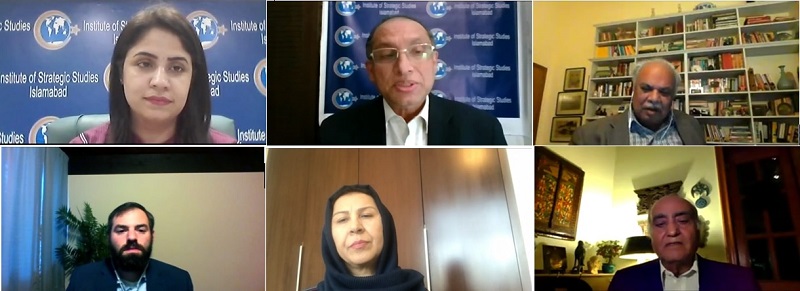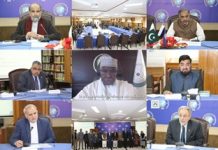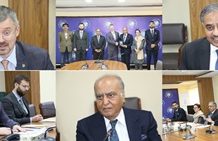Press Release
Centre for Afghanistan, Middle East & Africa (CAMEA)
Panel Discussion
“Biden’s Foreign Policy Approach Towards Afghanistan”
24 February, 2021

The Centre for Afghanistan, Middle East & Africa (CAMEA) at the Institute of Strategic Studies Islamabad (ISSI) hosted a Panel Discussion today. The panel of experts included: Ms. Shinkai Zahine Karokhail, Member of the Afghan Parliament (Wolesi Jerga); Ambassador Riaz Mohammad Khan, Author of “Afghanistan and Pakistan: Conflict, Extremism and Resistance to Modernity” and Mr. Michael Kugelman, Senior Associate, Wilson Center.
Opening the panel discussion, Ms. Amina Khan, Director Centre for Afghanistan, Middle East & Africa (CAMEA) said that many have questioned the integrity of the US-Taliban agreement of February 2020 for being severely modest for what it contains, at the same time the agreement must be acknowledged and appreciated for happening at all – after all considering the bloodshed the country has had to suffer – this is the best option for peace the Afghans will get. She said since the signing of the agreement, there have been a number of hurdles in its actual implementation however, the fact that all sides are engaging is encouraging and a necessary step for a stable Afghanistan.
She said that this is a historic opportunity for the Afghans to rewrite history but for that both principal stake holders, the Afghan government and Taliban will have to move beyond the rhetoric, find the middle ground and be willing to compromise on their initial and maximalist positions. Until then, the chances of peace and stability in Afghanistan remain elusive to say the least.
While talking about the US troops withdrawal from Afghanistan ,Ambassador Riaz Muhammad Khan was of the view that while the matter is still formally under review, the Biden administration does not want a complete withdrawal but would rather prefer to maintain a residual presence. He further said that the actual dilemma faced by the Biden administration is that maintaining status quo in Afghanistan is not an option. He suggested that a negotiated extension of US troop presence with the Taliban would be the only viable option for the new US administration at the moment.
About the role of Pakistan, he advised circumspection and restraint, while explaining that Islamabad would need assurances that Afghan soil will not be used against it by India. He urged internal stakeholders within Afghanistan to play their role as domestic institutions could strengthen the country as much will depend on emergence of viable Afghan forces with support from major sections of the Afghan population.
Ms. Shinkai Zahine Karokhail was of the view that while a new US administration gives hope, it is important to remember that the Afghan government is one of the crucial strategic partners with the US in the peace process. She also remarked that as the new US government reviews this agreement to withdraw partially or fully, it cannot gain anything if the people of Afghanistan are not taken on board. Role of regional players like Pakistan, Russia, China, Iran, India and the Central Asian states cannot be ignored and the US cannot end the conflict without their involvement. Commenting on the role of women, she said that no one can represent women other than themselves and peace cannot be sustained without meaningful participation of women. It is crucial that the voice of half of the country’s population be heard.
Mr. Michael Kugelman said that the biggest hurdle for the new administration was that it could not be brought up to speed on the Afghan issue during the transition time-period. Negotiating for an extension of US troop stay is what the new administration is currently looking into, however, to achieve this, the Taliban could ask for certain concessions in return, such as taking them off the US sanctions list or acquiring a sizeable piece in the future interim government setup. He also remarked that the new US administration would continue to include Pakistan as an important interlocutor to use its influence with the Taliban to help with the peace process. In this regard, said that the US has appreciated Pakistan’s outreach to all Afghan factions.Responding to a question about the Taliban, Mr Kugelman said that trust cannot be found with the Taliban, instead Washington must look for pathways to negotiate a peaceful political settlement.
Speaking about Pak-Afghan bilateral ties, Director General ISSI, Ambassador Aizaz Ahmad Chaudhry stated that their mutual relationship is critical to secure lasting peace in Afghanistan. He said that there is a consensus inside Pakistan that stability in Afghanistan translates into stability for Pakistan. Outlining positive developments between the two neighbors, Ambassador Chaudhry mentioned the Afghanistan – Pakistan Action Plan for Peace and Solidarity (APAPS), bilateral visits, border management and increasing people-to-people contacts. He also said Pakistan is following a policy of reaching out to all the different political factions which is quite important as it sends a crucial message across the border that Afghan leaders are respected in Pakistan. To the Taliban, it conveys that Pakistan does not give preference to any one faction in Afghanistan.
Ambassador Khalid Mahmood, Chairman BOG ISSI explained that there are several levels of stakeholders in the Afghan peace process namely the US, Taliban, Afghan government and regional countries where Pakistan’s role is crucial. It is clear now that peace and stability in Afghanistan is directly linked to peace and economic development in Pakistan. There are many challenges to the peace process including the US’s decision to either stay or withdraw from Afghanistan which makes it a catch-22 situation.
Director CAMEA, Ms Amina Khan concluded the discussion on a positive note that peace will surely return to Afghanistan and the region at large.











